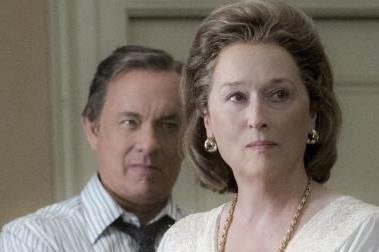Summary
“What will happen if we don’t publish? We will lose! The country will lose!” In a tumultuous political climate such as ours, The Post, directed by Steven Spielberg (Saving Private Ryan, Munich, and Schindler’s List), reminds us of the integral function that a free press serves in our democracy. The Post follows Kay Graham, enchantingly portrayed by three-time Academy Award winner Meryl Streep (The Iron Lady, Sophie’s Choice, and Kramer vs Kramer), the publisher of a then-family company (The Washington Post) as she takes the company public. Accompanied by her editor and former White House reporter Ben Bradlee, played effortlessly by the two-time Academy Award winner Tom Hanks (Forrest Gump, and Philadelphia), they are just barely scraping by.
One day, the New York Times publishes an exposé on a government cover-up spanning four administrations and they are delivered a cease and desist letter from the Attorney General (on behalf of President Nixon). This is where the story truly begins as Graham struggles with her investors who do not want her to ruin the newly public company, and Bradlee who uses the above quote to urge her otherwise. She makes her decision and the rest is, well, history.
Besides Hanks and Streep there is also Sarah Paulson, Bob Odenkirk, playwright Tracy Letts, Bradley Whitford, and David Cross.
Analysis
There are three main components that make this film work, none of which will come as a surprise: Meryl Streep, Tom Hanks, and Steven Spielberg’s directing. To begin my praises, Meryl Streep is a benison for this film. She portrays Kay Graham as a woman who is not only struggling to coexist in a male dominated industry, but also coming to grips with the suicide of her husband (the reason she is the publish for The Washington Post). With Streep’s performance, Graham comes off the screen with incredible depth; Streep can easily be seen as the queen of subtlety. In moments of conflict when the real Graham would have been trapped in deep contemplation, the gears turn in Streep’s head. She is enchanting in the scenes that are written for her to shine in, and never falls flat in those written for other characters (after all, this is the Meryl Streep).
Another incredible facet of the film is Tom Hanks as Ben Bradlee. He portrays a stern man as a belligerently voracious seeker of the truth. This was the performance that could not have been played by any other actor. Hanks compels the audience to actively think about the press in American society; even when Streep should be in the spotlight, Hanks makes a move or says something that steals it away from her. However, there are times that Streep and Hanks seem to pull on the spotlight in a game of tug-of-war. There are finite number of scenes that only have Hanks and Streep in it. When those scenes occur, however, it is akin to seeing two gods duke it out on a Friday night.
The final facet that makes this film something more than just a “based on a true story” movie is the director himself: Steven Spielberg. When Spielberg directs a film, he captures a sense of wonder that rivals none; as I watched a simple scene of newspapers being printed, I felt captured in the gears, I could smell the ink, and feel the soft, dry paper against my hands. It was in this moment I found myself gleefully staring at the screen and thinking to myself, “Spielberg has the eye of a child.” In an age where theaters are filled with direction that can literally be mind-numbing at times, it is refreshing to see such a skillful director make a film like this. Spielberg is keen to wonder, confrontation, empathy, and a plethora of other strong emotions.
Unfortunately, no film is perfect and this one is no different. The film is socially relevant in two ways: it uses historical context to highlight the importance of a free press in a democracy, as well as send the message that women can do the same things as men. Sadly, the latter falls flat and feels forced by the end. Throughout the film, Streep shows this through her nuanced performance of Kay Graham; there are even a few shots that show how powerful women inherently are. However, in one of the final scenes of the film, Spielberg pushes it one shot too far and forces it down your throat. Another, albeit slight, issue I had taken with the film was the screenplay written by Liz Hannah and Josh Singer. It is apparent that there were two writers in certain instances of the film (being this is spoiler-free, I’ll not go into great detail).
Verdict
Altogether The Post is a strong endorsement of the American press with a cast that makes it relatable and feel organic. The film pulls no punches in its comparison of the actions of Nixon and the tumult we see in today’s political climate. When Streep holds back tears of anxiety as she stares at a television set, watching the news reporting the evisceration of the first amendment by Nixon, you can feel the urgency ooze off of the screen. When the Supreme Court gives its verdict, the words ring slice through the air: “The Founding Fathers gave the free press the protection it must have to fulfill its essential role in our democracy. The press is to serve the governed, not the governors.”
Rating: 9/10




